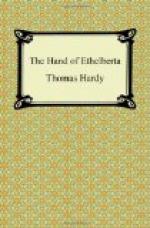He had learnt by this time her occupation, which was that of pupil-teacher at one of the schools in the town, whither she walked daily from a village near. If he had not been poor and the little teacher humble, Christopher might possibly have been tempted to inquire more briskly about her, and who knows how such a pursuit might have ended? But hard externals rule volatile sentiment, and under these untoward influences the girl and the book and the truth about its author were matters upon which he could not afford to expend much time. All Christopher did was to think now and then of the pretty innocent face and round deep eyes, not once wondering if the mind which enlivened them ever thought of him.
3. Sandbourne moor (continued)
It was one of those hostile days of the year when chatterbox ladies remain miserably in their homes to save the carriage and harness, when clerks’ wives hate living in lodgings, when vehicles and people appear in the street with duplicates of themselves underfoot, when bricklayers, slaters, and other out-door journeymen sit in a shed and drink beer, when ducks and drakes play with hilarious delight at their own family game, or spread out one wing after another in the slower enjoyment of letting the delicious moisture penetrate to their innermost down. The smoke from the flues of Sandbourne had barely strength enough to emerge into the drizzling rain, and hung down the sides of each chimney-pot like the streamer of a becalmed ship; and a troop of rats might have rattled down the pipes from roof to basement with less noise than did the water that day.
On the broad moor beyond the town, where Christopher’s meetings with the teacher had so regularly occurred, were a stream and some large pools; and beside one of these, near some hatches and a weir, stood a little square building, not much larger inside than the Lord Mayor’s coach. It was known simply as ‘The Weir House.’ On this wet afternoon, which was the one following the day of Christopher’s last lesson over the plain, a nearly invisible smoke came from the puny chimney of the hut. Though the door was closed, sounds of chatting and mirth fizzed from the interior, and would have told anybody who had come near—which nobody did—that the usually empty shell was tenanted to-day.
The scene within was a large fire in a fireplace to which the whole floor of the house was no more than a hearthstone. The occupants were two gentlemanly persons, in shooting costume, who had been traversing the moor for miles in search of wild duck and teal, a waterman, and a small spaniel. In the corner stood their guns, and two or three wild mallards, which represented the scanty product of their morning’s labour, the iridescent necks of the dead birds replying to every flicker of the fire. The two sportsmen were smoking, and their man was mostly occupying himself in poking and stirring the fire with a stick: all three appeared to be pretty well wetted.




